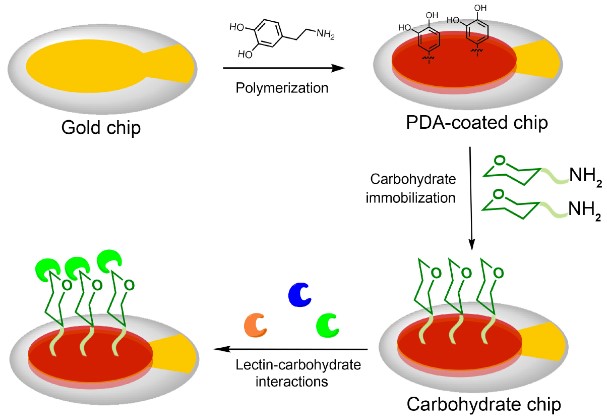Lectin Blot Analysis for Glyco-code Based Diagnostics
In glycan researches, lectin is one of the most useful tools with the capability to recognize different glyco-codes. In this context, how the role lectin-blot analysis plays in glyco-code based diagnostics is self-evident. With extensive experience and a professional expert team, Creative Biolabs is confident in offering high-quality lectin blot analysis services to global customers.
Overview of Glycan in Diagnostics
An attractive target for receptor-mediated interaction is carbohydrates and, in particular glycoconjugates, which play important roles in cancer development and metastasis. Carbohydrates are uniquely suited for encoding biological information because of their rich structural variations. Aberrant glycosylations on tumor cell surfaces have been extensively probed by antibodies and plant-derived lectins. This led to the identification of characteristic tumor-associated carbohydrate molecules, which has greatly facilitated the development of carbohydrate-based anticancer vaccine studies. In comparison, the understanding of carbohydrate-binding properties of tumors is not as advanced. Cancer cells can interact with the extracellular matrix in their microenvironment through endogenous receptors binding with carbohydrates. These interactions vary, depending on the physiological state of the cells, as supported by the ground-breaking histological studies of tumor tissues. Therefore, the ability to characterize and distinguish carbohydrate-binding profiles of a variety of cells can expedite both the mechanistic understanding of their roles in disease development and the expansion of diagnostic and therapeutic tools.
Introduction of Lectin
Lectins are naturally synthesized in diverse organisms, such as plants, animals, algae, fungal and yeast organisms, bacteria, and viruses. Their major source is plant seeds or, more generally, the storage organs of plants, which include seeds, roots, tubers or bulbs, bark, and leaves. Within the cells, lectins are found primarily in protein bodies, but also in the cytoplasm and in the intercellular space. The intracellular amount of lectin can change drastically between species but the wide distribution of lectins in Nature (in terms of species, tissues, and cells) reflects the importance of these molecules in living organisms.
Lectins are proteins or glycoproteins that can selectively bind to particular glycan structures. A more complete definition describes lectins as proteins or glycoproteins of non-immune origin, interacting with carbohydrates through at least two binding sites, agglutinating vegetable and/or animal cells, and precipitating polysaccharides, glycoproteins, or glycolipids.
 Fig.1 Real-time measurement of carbohydrate-lectin interactions.1, 2
Fig.1 Real-time measurement of carbohydrate-lectin interactions.1, 2
Lectin Blot Analysis
Lectin blot analysis is a simple and useful method based on western blot analysis, which is a routine experiment for many laboratories. In the case of lectin blot analysis, researchers are not required to release the glycans from glycoproteins and can obtain information about the glycan structures on their own. The combination of glycosidase digestion and lectin staining provides information regarding the carbohydrate structures at the nonreducing termini, types of N-glycan subgroups, and presence or absence of O-glycans in individual glycoproteins. The glycosylation patterns between the control and test group can be compared by lectin blot analysis. For instance, lectin blot analysis has revealed that the expression of β-N-acetylgalactosaminylated N-glycans is associated with functional development of the bovine mammary gland and malignant transformation of human mammary epithelial cells, that the treatment with anticancer drug affects the glycosylation of SW480 human colorectal cancer cells, and that the β-1,4-galactosylation of N-glycans increases depending on cell density of mouse BALB/3T3 fibroblasts.
Services at Creative Biolabs
As a global-leading glycoprotein-relevant services provider, Creative Biolabs has solid foundations and state-of-art technologies. We have thrown a lot of human power, materials, and financial resource in this field in recent years, thus we have accumulated extensive experience and great reputations. Our platform is capable of providing customer-satisfied lectin blot analysis to global clients. Also, we help with tumor-associated glycan detection services including but are not limited to:
If you are looking for help in lectin blot analysis services or you have any other questions about our services, please feel free to contact us for more information.
References
-
Shang, Kun, et al. "Fabrication of carbohydrate chips based on polydopamine for real-time determination of carbohydrate–lectin interactions by QCM biosensor." Polymers 10.11 (2018): 1275.
-
Under Open Access license CC BY 4.0, without modification.
For Research Use Only.
Related Services

 Fig.1 Real-time measurement of carbohydrate-lectin interactions.1, 2
Fig.1 Real-time measurement of carbohydrate-lectin interactions.1, 2

